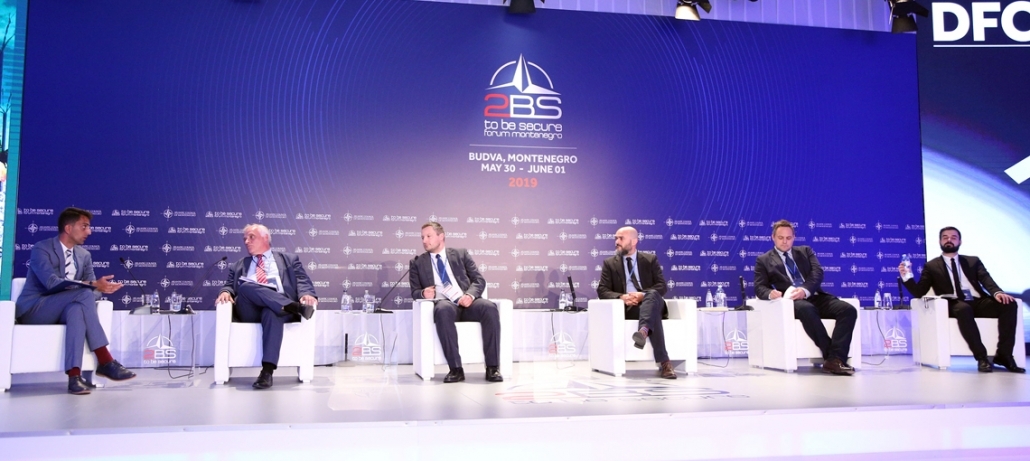DISINFORMATION AFFECTS ALL SOCIETIES; IT IS NECESSARY TO ENCOURAGE CRITICAL THINKING
Modern civilization created what could be the weapon of mass destruction of society, and we do not know what will happen and what circumstances we can excpect in 15-20 years. This is one of the messages conveyed during the last panel discussion under the title ”Age of disinformation: learning resilience and living with lies” within To Be Secure (2BS) Forum in Budva.
The panelists said, among other things, that disinformation affects all societies, and that disinformation is just the tip of the iceberg. Therefore, critical thinking should be encouraged through media literacy campaigns.
Robert Pszczel, Senior Officer for Russia and the Western Balkans of NATO PDD thinks that when speaking about disinformation, one has to put them in a certain context.
”This is a part of a widespread disease. Disinformation is oftenly connected. Awareness of all this has just been created. Different actors have different responsibilities. The youth is overfocused on media platforms”, he said.
He appealed for investigative journalism, stating that a good investigative journalist is a rare sort in this part of the world.
”Televison remains very important”, said Pszczel.
Arnis Šnore, Deputy Director of the European Centre of Excellence for Countering Hybrid Threats, said that they consider this issue one of the means of a wider hybrid environment.
To realize where we stand now and what we have to do in order to become more resilient is the most important thing, according to him.
”Tradicional media must adhere to the laws, they are responsible if they publish lies. The same thing should apply to platforms, they do not make the exception simply because they are ”platforms”. They are gaining profit, and that is exactly why their responsibility is greater” said Šnore, who also evaluated that we are currently fighting the consequences of the information.
Rufin Zamfir, Program Director of GlobalFocus Center in Romania said that disinformation is ”just the tip of the iceberg”.
”That’s what keeps me awake. The fact is that disinformation and propaganda are the most visible in our societies, but subversion is something we cannot see. The relations between the business world and the politics is troubling. We often believe in lies, since they reflect our own covictions and fill the gaps we wish have been filled”, stated Zamfir.
Part of the issue, as he said, is not the result of disinformation campaigns, but also the result of false information or misinformation.
”And here the critical thinking that needs to be encouraged by media literacy campaigns takes effect. It is something that affects the society as a whole”, he said.
Zamfir stated that media reporting in Serbia is not the result of Russia’s actions. It is the result of the regulation of the Governement and the President Aleksandar Vučić.
Nicolas de Pedro, Senior Fellow at the Institute for Statecraft, said that we are far from fully understanding the challenges we are facing and that fact is alarming.
”We are connected 24/7, information is the beating heart of our lives, we use social networks, we created the thing that can be the weapon of mass destruction of the society. We have no idea what will happen and in what circumstances we will find ourselves in 15 or 20 years. We shoud bare in mind that disinformation is not a domain, it is something which affects all societies. This is not the issue of two or three media outlets, this is a phenomenon influencing the society“, stated de Pedro.
Russia knows how to use the system for undermining, and we need to create a strategy that will help us fight it, he explained.
“I think that we are far away, that we do not have the proper understanding of the problem, it is difficult to develop a strategy because of the nature of challenges and threats. In the foreseeable future, we will lack the most powerful asset, and that’s the narrative”, said de Pedro.
Tomáš Kriššák, Project Coordinator of Open Society Foundation in Bratislava, said that sometimes he has to stay awake the whole night just in order to prevent disinformation.
“They keep us awake. Every day we wake up and see a new media scene created by an ocean of information, some of which are toxic. The great challenge and the problem is the impact on our lives and society. We are reprogramming a new civilization. We are the worst version of ourselves, “said Kriššák, who also identified the amount of information that is in fact disinformation as extremely problematic.
He stated that social platforms were made by a man, and everything made by a man can be used in a good and a bad way.
”We should teach people how to use the platforms properly. It is understandable to say that in this period the platforms may make mistakes, but after years of existence, a determined action that implies a better way of moderating has to be undertaken. Take for example Facebook moderators, who are quite unprofessional”, said Kriššák
